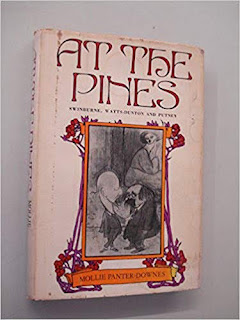Shetland is the perfect place to escape the current heat wave that's afflicting the rest of the country, the weather here has been great - mostly sunny, but in the mid to high teens, and a very pleasant breeze. It's perfect doing weather.
Because it's perfect doing weather I haven't had much time for reading (yarn to buy, people to see, beaches to walk on) but I have eventually managed to get through 'At The Pines'. I saw this mentioned by Slightly Foxed and thought it sounded like fun - it's an account of the later life of the poet, Algernon Charles Swinburne, and his time living in Putney with his friend Theodore Watts-Dunton.
Swinburne had more or less run out of money (expensive diversions in St Johns Wood are partly to blame) and was drinking himself to death- a particularly unpleasant way to go, when Watts-Dunton swooped in and carried him off. He dries Swinburne out and regulates his life so successfully that they spend the next 25 years together in domestic suburban harmony.
I thought this might be fun, but it seems to be one of those books that deserves its current obscurity. Swinburne is still probably chiefly remembered as part of the Pre-Raphaelite circle, but to Mollie he's still the star poet, and she seems to share some of Swinburne's friends dismay and disdain for Watts-Dunton and the life he imposed on him.
The general opinion seems to be that he saved the man but killed the poet, which seems a bit unfair as the poet had damn near killed himself by the time of the intervention. That he should have been left to drink himself to death in the hope that a few more fragments of really good work might emerge from the chaos seems like a fairly shitty proposition.
Meanwhile Watts-Dunton, who sounds like he might be worth knowing a lot more about is continuously dismissed. A middling class lawyer who moved in artistic and literary circles, he was an attractive enough personality to be in high demand. He also seems to have tried to rescue Rossetti (who died in his arms) as he had Swinburne. I wonder who was happier living in suburban seclusion; the increasingly deaf Swinburne, absolved of all the tiresome responsibilities he'd been so poor at meeting, and seemingly devoted to the friend who had rescued him, or the sociable Watts-Dunton who gave up a considerable portion of his social life.
The biggest problem with this book though is that it's at least twice the length it needs to be, and felt a bit like wading through treacle (or manoeuvring through an over stuffed Victorian parlour). It's a surprisingly dull book.
What did make an interesting footnote however is that some of the furniture from the Pines has ended up in Wightwick manor (National Trust property near Birmingham), including a really impressive painted cabinet with a bed in it.

No comments:
Post a Comment